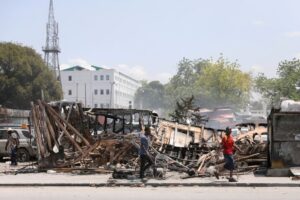Since Russia invaded Ukraine, imperialist hypocrites of every stripe have taken center stage to denounce it. President Joe Biden is among the worst of them. His decades-long political career as an imperialist warmonger preceded his March 1st State of the Union address. Yet, as if he is a freedom fighter, Biden received enthusiastic bipartisan applause after stating that Putin “thought he could divide us at home, in this chamber and this nation. But Putin was wrong. We are ready. We are united.”
Some of the most hypocritical voices on the left have also emerged to declare that the US and NATO—not Russia—are the main culprits. For example, see the Party of Socialism and Liberation (PSL) statement, which argues:
It is critically important for people in the United States, who are receiving the bulk of their information from the capitalist media that functions as an echo chamber for the U.S. government, to know that the current crisis is the byproduct of a long effort by the United States to establish absolute domination throughout Europe.
But Russia is itself an imperialist power, with its own aims and means–like every other imperialist state around the globe–to subject the nations it oppresses under its control. Ukraine has been one of Russia’s oppressed nations for centuries–beginning with Tsarist Russia, then under the control of Stalin’s Soviet Union after 1928. When the Soviet Union collapsed in 1991, Ukraine finally achieved its long-standing claim as an independent nation. Now Putin seeks to return Ukraine to Russian control, through its invasion and war on Ukraine.
Nevertheless, it is crucial to appreciate an important part of Ukraine’s history which is often overlooked. The Ukraine people–who have their own language and long cultural traditions–were first granted their right to independence in the immediate aftermath of the Russian Revolution of 1917. In the following excerpt from an article printed in Pravda in 1920, Russian revolutionary V.I. Lenin assured Ukrainian people that they–and they alone–would determine the future of Ukraine.
The independence of the Ukraine has been recognised both by the All-Russia Central Executive Committee of the R.S.F.S.R. (Russian Socialist Federative Soviet Republic) and by the Russian Communist Party (Bolsheviks). It is therefore self-evident and generally recognized that only the Ukrainian workers and peasants themselves can and will decide at their All-Ukraine Congress of Soviets whether the Ukraine shall amalgamate with Russia, or whether she shall remain a separate and independent republic, and, in the latter case, what federal ties shall be established between that republic and Russia.
How should this question be decided insofar as concerns the interests of the working people and the promotion of their fight for the complete emancipation of labor from the yoke of capital?
In the first place, the interests of labor demand the fullest confidence and the closest alliance among the working people of different countries and nations. The supporters of the landowners and capitalists, of the bourgeoisie, strive to disunite the workers, to intensify national discord and enmity, in order to weaken the workers and strengthen the power of capital.
Capital is an international force. To vanquish it, an international workers’ alliance, an international workers’ brotherhood, is needed.
We are opposed to national enmity and discord, to national exclusiveness. We are internationalists. We stand for the close union and the complete amalgamation of the workers and peasants of all nations in a single world Soviet republic.
Secondly, the working people must not forget that capitalism has divided nations into a small number of oppressor, Great-Power (imperialist), sovereign and privileged nations and an overwhelming majority of oppressed, dependent and semi-dependent, non-sovereign nations. The arch-criminal and arch-reactionary war of 1914-18 still further accentuated this division and as a result aggravated rancor and hatred. For centuries the indignation and distrust of the non-sovereign and dependent nations towards the dominant and oppressor nations have been accumulating, of nations such as the Ukrainian towards nations such as the Great-Russian.
We want a voluntary union of nations—a union which precludes any coercion of one nation by another—a union founded on complete confidence, on a clear recognition of brotherly unity, on absolutely voluntary consent. Such a union cannot be affected at one stroke; we have to work towards it with the greatest patience and circumspection, so as not to spoil matters and not to arouse distrust, and so that the distrust inherited from centuries of landowner and capitalist oppression, centuries of private property and the enmity caused by its divisions and redivisions may have a chance to wear off.
We must, therefore, strive persistently for the unity of nations and ruthlessly suppress everything that tends to divide them, and in doing so we must be very cautious and patient, and make concessions to the survivals of national distrust. We must be adamant and uncompromising towards everything that affects the fundamental interests of labor in its fight for emancipation from the yoke of capital. The question of the demarcation of frontiers now, for the time being—for we are striving towards the complete abolition of frontiers—is a minor one, it is not fundamental or important. In this matter we can afford to wait, and must wait, because the national distrust among the broad mass of peasants and small owners is often extremely tenacious, and haste might only intensify it, in other words, jeopardize the cause of complete and ultimate unity.
The experience of the workers’ and peasants’ revolution in Russia, the revolution of October-November 1917, and of the two years of victorious struggle against the onslaught of international and Russian capitalists, has made it crystal clear that the capitalists have succeeded for a time in playing upon the national distrust of the Great Russians felt by Polish, Latvian, Estonian and Finnish peasants and small owners, that they have succeeded for a time in sowing dissension between them and us on the basis of this distrust. Experience has shown that this distrust wears off and disappears only very slowly, and that the more caution and patience displayed by the Great Russians, who have for so long been an oppressor nation, the more certainly this distrust will pass. It is by recognizing the independence of the Polish, Latvian, Lithuanian, Estonian and Finnish states that we are slowly but steadily winning the confidence of the laboring masses of the neighboring small states, who were more backward and more deceived and downtrodden by the capitalists. It is the surest way of wresting them from the influence of “their” national capitalists, and leading them to full confidence, to the future united international Soviet republic.
There must be unity in the struggle against the yoke of capital and for the dictatorship of the proletariat, and there should be no parting of the ways among Communists on the question of national frontiers, or whether there should be a federal or some other tie between the states. Among the Bolsheviks there are advocates of complete independence for the Ukraine, advocates of a more or less close federal tie, and advocates of the complete amalgamation of the Ukraine with Russia.
There must be no differences over these questions. They will be decided by the All-Ukraine Congress of Soviets.
If a Great-Russian Communist insists upon the amalgamation of the Ukraine with Russia, Ukrainians might easily suspect him of advocating this policy not from the motive of uniting the proletarians in the fight against capital, but because of the prejudices of the old Great-Russian nationalism, of imperialism. Such mistrust is natural, and to a certain degree inevitable and legitimate, because the Great Russians, under the yoke of the landowners and capitalists, had for centuries imbibed the shameful and disgusting prejudices of Great-Russian chauvinism.
Consequently, we Great-Russian Communists must repress with the utmost severity the slightest manifestation in our midst of Great-Russian nationalism, for such manifestations, which are a betrayal of communism in general, cause the gravest harm by dividing us from our Ukrainian comrades and thus playing into the hands of Denikin and his regime.
Consequently, we Great-Russian Communists must make concessions when there are differences with the Ukrainian Bolshevik Communists and Borotbists and these differences concern the state independence of the Ukraine, the forms of her alliance with Russia, and the national question in general. But all of us, Great-Russian Communists, Ukrainian Communists, and Communists of any other nation, must be unyielding and irreconcilable in the underlying and fundamental questions which are the same for all nations, in questions of the proletarian struggle, of the proletarian dictatorship; we must not tolerate compromise with the bourgeoisie or any division of the forces which are protecting us against Denikin.
In this long and hard fight we Great-Russian and Ukrainian workers must maintain the closest alliance, for separately we shall most definitely be unable to cope with the task. Whatever the boundaries of the Ukraine and Russia may be, whatever may be the forms of their mutual state relationships, that is not so important; that is a matter in which concessions can and should be made, in which one thing, or another, or a third may be tried—the cause of the workers and peasants, of the victory over capitalism, will not perish because of that.
But if we fail to maintain the closest alliance, an alliance against Denikin, an alliance against the capitalists and kulaks of our countries and of all countries, the cause of labor will most certainly perish for many years to come in the sense that the capitalists will be able to crush and strangle both the Soviet Ukraine and Soviet Russia.
And what the bourgeoisie of all countries, and all manner of petty-bourgeois parties, i.e., “compromising” parties which permit alliance with the bourgeoisie against the workers—try most of all to accomplish is to disunite the workers of different nationalities, to evoke distrust, and to disrupt a close international alliance and international brotherhood of the workers. Whenever the bourgeoisie succeeds in this the cause of the workers is lost. The Communists of Russia and the Ukraine must therefore by patient, persistent, stubborn and concerted effort foil the nationalist machinations of the bourgeoisie and vanquish nationalist prejudices of every kind, and set the working people of the world an example of a really solid alliance of the workers and peasants of different nations in the fight for Soviet power, for the overthrow of the yoke of the landowners and capitalists, and for a world federal Soviet republic.
N. Lenin
December 28, 1919




